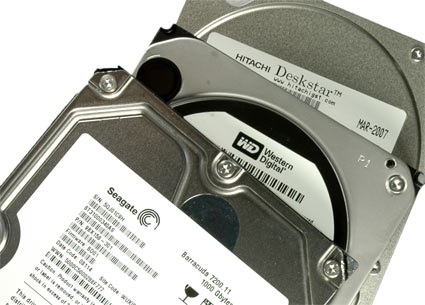The Terabyte Battle
Seagate Barracuda 7200.11 Joins The Terabyte Club
Those who wanted to ship their terabyte hard drives fast came in late this time. I'm referring to Samsung and Seagate, who intended to overtake Hitachi by providing terabyte hard drives based on a higher data densities, and thus using a smaller platter count than the Deskstar 7K1000's five platters. Fewer platters per hard drive mean fewer mechanical parts that wear and tear, and the side effect is always better transfer performance. All of this remains theory, though, unless products are actually available. We still haven't seen Samsung's three-platter terabyte hard drive, but the Seagate Barracuda 7200.11 has finally arrived.
While capacities seemed to be stuck at 500 GB for a while, with only Seagate going up to 750 GB, we now have three contestants battling at up to 1000 GB. Samsung will hopefully join soon, as its drives have proven to be quick and quiet over the last few years. But what is next? Western Digital declared its intention to deliver 3 TB hard drives by 2010, which represents a yearly data density increase of 40%. Samsung told us earlier this year that capacities between 1 and 2 TB should be available rather early next year. In any case, the battle for the prestigious high-end storage segment will continue, as the drive makers continue to exploit perpendicular magnetic recording and get ready for the subsequent steps, like patterned media and heat assisted recording Compare Prices on 1 TB Barracuda 7200.11.
It's still some time until 2010, and I believe we will still chronically suffer from insufficient storage capacities in the light of increasing amounts of data. There are times in which something as circumstantial as a printer driver package requires far more than 100 MB, and where Windows Update downloads more data than the Windows installation ever put on your hard drive. We not only store digital movies like we stored music or pre-multimedia files some years ago, but we'll increasingly store more and more High Definition content as well. Thus, if you ever wondered why anyone needs a terabyte hard drive today, here is a simple answer: one terabyte stores approximately 220 single layer DVDs, which certainly is a lot, but is only sufficient for 30 to 40 movies in full HD quality. If you want to continue to store it all, you'll need more and more storage - and backup space too.
For the time being, one terabyte is the limit, and we currently have to choice among three entirely different product concepts. Hitachi was the first to reach the terabyte limit with the Deskstar 7K1000, which prove to be a solid performer. The second candidate is Western Digital's Caviar GP; these letters stand for "Green Power" and points out the way WD is going: the WD10EACS has its focus on energy efficiency, not on performance. Finally, there is the Barracuda 7200.11 by Seagate, which follows the traditional method of providing more capacity and more performance with every new drive generation. Let's see how the new "dot eleven" compares to its two competitors...
Join our discussion on this article!
Get Tom's Hardware's best news and in-depth reviews, straight to your inbox.
Current page: Seagate Barracuda 7200.11 Joins The Terabyte Club
Next Page Where Does The Hard Drive Go From Here?
Patrick Schmid was the editor-in-chief for Tom's Hardware from 2005 to 2006. He wrote numerous articles on a wide range of hardware topics, including storage, CPUs, and system builds.
-
andy_newton The Barracuda gets bricked after 6 months of use. While Seagate is kind enough to offer a free recovery, I lost 3 weeks of my time waiting. Upon receiving its unbricked with new firmware, the performance has now become terribly slow. It is very much different from the last moments before it got bricked.Reply
I contacted the customer service again and they give me a B.S. regarding this particular hard drive is not suitable foe use as external Drive.
I am both terribly surprised and disappointed that tomshardware did not amend any article regarding its performance (post recovery), since those performance charts with its defective firmware should be invalid.
Instead, Tomshardware continues to praise this hard drive and claims that in toms lab the bricking can not be repeated.
I am wondering how much money that seagate pays toms to shut up and not to publish any honest review regarding this other affected hard drives.
Or is it just me (again) waking up in a parallel universe where Seagate has never built any drives with defective firmware.
-ND -
flagoman mmm, you are out of place on your comments, here, couse i dont think that toms would be able to test any hardware for 6 months or until it fails. imagine how late every review would be delayed, its ridiculous,what you are asking what are you six years old??? shezzz... And the company offer you a recovery of the info of your hdd,and actually i found that a great plus, Seagate. but you should had take your info out, and buy a new one.Reply
